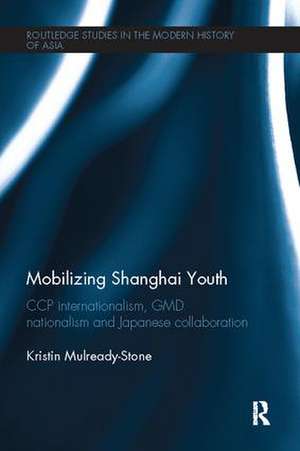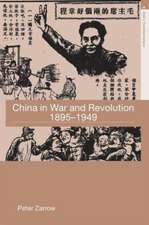Mobilizing Shanghai Youth: CCP Internationalism, GMD Nationalism and Japanese Collaboration: Routledge Studies in the Modern History of Asia
Autor Kristin Mulready-Stoneen Limba Engleză Paperback – 25 mai 2017
Mobilizing Shanghai Youth explores the similarities and differences among three youth organizations that were connected to Chinese political parties or governments in Shanghai, spanning from the beginning of the May Fourth Movement, just as youth began to emerge as a powerful social and political force in China, to World War II, when Nationalist, Communist and Japanese forces were still competing for dominance. It takes a comparative approach in exploring the similarities and differences, trials and tribulations in how the Chinese Communist Party, Chinese Nationalist Party and a series of collaborationist regimes sought to appeal to youth through the Communist Youth League, the Three People’s Principles Youth Corps and the China Youth Corps. Focusing on Greater Shanghai allows a detailed exploration of the rise and fall of the original Communist Youth League and its connections to international communism. The spotlight on Shanghai also yields the extraordinary finding that the Three People’s Principles Youth Corps was a valuable asset to the Nationalist Party, operating as a potent resistance organization in Japanese-controlled Shanghai whereas branches in Nationalist-controlled territory were factionalized, dysfunctional and a terrible liability for the Party. Most surprisingly, the collaborationist China Youth Corps took the most practical and in some ways the most successful approach to mobilizing China’s youth.
The result of exhaustive archival research, this book will be of huge interest to students and scholars of Chinese history, modern history, Communism and the role of youth in revolution.
| Toate formatele și edițiile | Preț | Express |
|---|---|---|
| Paperback (1) | 449.41 lei 6-8 săpt. | |
| Taylor & Francis – 25 mai 2017 | 449.41 lei 6-8 săpt. | |
| Hardback (1) | 1109.18 lei 6-8 săpt. | |
| Taylor & Francis – 18 noi 2014 | 1109.18 lei 6-8 săpt. |
Din seria Routledge Studies in the Modern History of Asia
-
 Preț: 311.33 lei
Preț: 311.33 lei -
 Preț: 311.41 lei
Preț: 311.41 lei -
 Preț: 310.16 lei
Preț: 310.16 lei -
 Preț: 310.95 lei
Preț: 310.95 lei -
 Preț: 311.91 lei
Preț: 311.91 lei - 9%
 Preț: 901.50 lei
Preț: 901.50 lei -
 Preț: 371.71 lei
Preț: 371.71 lei - 25%
 Preț: 711.72 lei
Preț: 711.72 lei - 18%
 Preț: 1278.70 lei
Preț: 1278.70 lei - 18%
 Preț: 948.84 lei
Preț: 948.84 lei - 18%
 Preț: 1055.21 lei
Preț: 1055.21 lei - 18%
 Preț: 1333.33 lei
Preț: 1333.33 lei - 18%
 Preț: 1003.30 lei
Preț: 1003.30 lei - 18%
 Preț: 1060.87 lei
Preț: 1060.87 lei -
 Preț: 424.87 lei
Preț: 424.87 lei -
 Preț: 485.94 lei
Preț: 485.94 lei - 18%
 Preț: 1004.86 lei
Preț: 1004.86 lei - 18%
 Preț: 1326.99 lei
Preț: 1326.99 lei - 18%
 Preț: 1060.87 lei
Preț: 1060.87 lei - 18%
 Preț: 1058.65 lei
Preț: 1058.65 lei -
 Preț: 441.80 lei
Preț: 441.80 lei - 26%
 Preț: 820.03 lei
Preț: 820.03 lei - 18%
 Preț: 1059.84 lei
Preț: 1059.84 lei - 25%
 Preț: 824.17 lei
Preț: 824.17 lei - 18%
 Preț: 1063.65 lei
Preț: 1063.65 lei - 18%
 Preț: 1059.84 lei
Preț: 1059.84 lei - 49%
 Preț: 218.36 lei
Preț: 218.36 lei - 18%
 Preț: 704.83 lei
Preț: 704.83 lei - 18%
 Preț: 1012.10 lei
Preț: 1012.10 lei - 25%
 Preț: 826.86 lei
Preț: 826.86 lei - 18%
 Preț: 1002.63 lei
Preț: 1002.63 lei - 15%
 Preț: 699.14 lei
Preț: 699.14 lei - 18%
 Preț: 1114.30 lei
Preț: 1114.30 lei - 25%
 Preț: 996.56 lei
Preț: 996.56 lei - 26%
 Preț: 765.01 lei
Preț: 765.01 lei - 18%
 Preț: 1059.84 lei
Preț: 1059.84 lei - 26%
 Preț: 821.94 lei
Preț: 821.94 lei - 18%
 Preț: 1056.00 lei
Preț: 1056.00 lei - 18%
 Preț: 1006.07 lei
Preț: 1006.07 lei -
 Preț: 488.71 lei
Preț: 488.71 lei - 18%
 Preț: 999.46 lei
Preț: 999.46 lei - 18%
 Preț: 1051.55 lei
Preț: 1051.55 lei - 18%
 Preț: 1065.78 lei
Preț: 1065.78 lei - 25%
 Preț: 769.10 lei
Preț: 769.10 lei - 18%
 Preț: 1054.43 lei
Preț: 1054.43 lei - 26%
 Preț: 765.01 lei
Preț: 765.01 lei - 18%
 Preț: 1009.21 lei
Preț: 1009.21 lei
Preț: 449.41 lei
Nou
Puncte Express: 674
Preț estimativ în valută:
86.01€ • 88.85$ • 71.58£
86.01€ • 88.85$ • 71.58£
Carte tipărită la comandă
Livrare economică 26 martie-09 aprilie
Preluare comenzi: 021 569.72.76
Specificații
ISBN-13: 9781138095076
ISBN-10: 1138095079
Pagini: 208
Ilustrații: 30
Dimensiuni: 156 x 234 mm
Greutate: 0.45 kg
Ediția:1
Editura: Taylor & Francis
Colecția Routledge
Seria Routledge Studies in the Modern History of Asia
Locul publicării:Oxford, United Kingdom
ISBN-10: 1138095079
Pagini: 208
Ilustrații: 30
Dimensiuni: 156 x 234 mm
Greutate: 0.45 kg
Ediția:1
Editura: Taylor & Francis
Colecția Routledge
Seria Routledge Studies in the Modern History of Asia
Locul publicării:Oxford, United Kingdom
Public țintă
Postgraduate and UndergraduateCuprins
Introduction 1. Early Development of the Socialist Youth League: The Internationalist Period, 1920-1923 2. Opportunity and Opportunism: The Rise and Fall of the Communist Youth League 3. Controlled Salvation: The Origins of the Three People’s Principles Youth Corps 4. The Shanghai Branch of the Three People’s Principles Youth Corps: Obedience, Challenges and Exceptionalism 5. Xie Jinyuan and the Shanghai Three People’s Principles Youth Corps 6. The China Youth Corps: A Collaborationist Mission for Youth 7. The China Youth Corps: Alluring Peace and Elusive Security 8. Conclusion
Notă biografică
Kristin Mulready-Stone is Assistant Professor of History at Kansas State University, USA.
Descriere
This book explores the similarities and differences among youth organizations that were connected to Chinese political parties or governments in Shanghai, spanning from the beginning of the May Fourth Movement to World War II. The result of exhaustive archival research, this book will be of huge interest to students and scholars of Chinese history, modern history, Communism and the role of youth in revolution.












